State DOT Certification Programs for Materials Sampling and Testing Personnel (2025)
Chapter: Appendix E: Other Qualification/Certification Programs
APPENDIX E
Other Qualification/Certification Programs
This appendix contains short descriptions of different certification programs related to materials sampling and testing that were referenced in the literature review. The programs are listed in alphabetical order: ACI, ACPA, ASQ, AI, ASTM, NCAT, NICET, NRMCA, NPCA, PCI, WACEL.
American Concrete Institute
The American Concrete Institute (ACI) is a non-profit entity focused on concrete testing and construction. It is supported by annual membership dues and lead by an elected Board. ACI has Local Chapters associated with over 40 states in the United States. The local chapters may be separate entities and operate independently of ACI.
The ACI Certification Programs Committee (CPC), which oversees the testing technician certifications, was formed in 1980 as the Certification Committee. The basic concrete field certification, the ACI Concrete Field Testing Technician – Grade 1 (ACI-CFT Grade 1), was the first certification program started in 1983. The ACI website indicates that ACI now has over 120,000 active certifications (ACI 2023), and over 130 Testing locations worldwide, including three DOTs (NC, RI, and TX).
While ACI has 30 individual certification programs (in the program areas of Testing, Inspection, Construction/Specialist, and Design Professional), those used by DOTs for sampling and testing are in the Testing Program. The Testing Program contains 13 certifications, one of which uses Canadian standards and one European standards; the remaining 11 certifications that could be applicable to DOTs are identified in Table E1 including the associated practices and test methods (both the AASHTO and ASTM methods are shown if ACI recognizes both on their website).
ACI has three resource centers in the U.S. that perform training, certification, and education. The Chicago/Midwest, Southern California, and Mid-Atlantic Centers are in Elk Grove Village, IL; San Bernardino, CA; and Columbia, MD, respectively. The Resource Centers are relatively new; the first one opened in 2021; the Mid-Atlantic Center opened most recently in 2023.
ACI-CFT Grade 1 is accepted or required by many DOTs for concrete field testing. The training is accessible as ACI allows others (called Sponsoring Groups) to run the programs locally. ACI has listed on their website over 120 Sponsoring Groups nationwide that can administer ACI training and certification. Three DOTs (Rhode Island, South Carolina, and Texas) are on that list. Rhode Island and South Carolina DOT’s both run three certification programs: Aggregate Testing Technician Grade 1 (ATT1), ACI-CFT Grade 1, and ACI Concrete Strength Testing Technician (ACI-CST). Texas DOT runs ACI-CFT Grade 1 and ACI-CST.
The ACI-CFT Grade 1 is a one hour closed-book exam with 55 multiple choice questions. A 70 percent passing score is required, with a minimum of 60 percent required for each test method. The certification is valid for five years. It includes a pass/fail performance exam for each
Table E1. ACI certification programs.
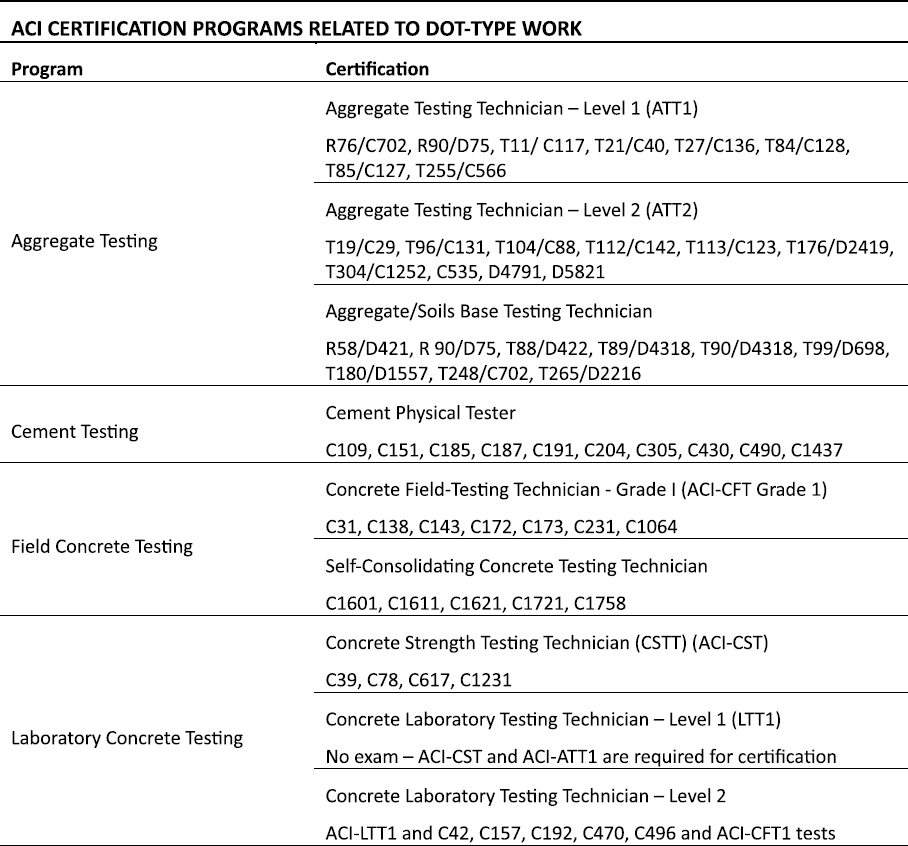
test method. There is no documented process to remove or revoke ACI technician certification. ACI does have a mobile app (ACI Certification Verify) that allows access to the ACI certification database to verify technician certification.
ACI also has a Concrete Transportation Construction Inspector certification and a Concrete Quality Technical Manager (CQTM) certification. The online certification registry notes over 700 Concrete Transportation Construction Inspectors in the U.S. The certification covers material from more than a dozen ACI Guides and Specifications. It includes two written exams, one covering plan reading and one covering inspection. It also has education or experience requirements. There are 50 Concrete Quality Technical Managers in the database with 19 of those in the United States. The Concrete Quality Technical Managers certification includes two written exams, and it has education or experience requirements. There is an overlap in four of the ACI Guides between the two programs, but the Transportation Construction Inspection has pavement specific components such as construction of concrete pavements and roller compacted concrete.
References
ACI, “History of ACI,” https://www.concrete.org/aboutaci/introductiontoaci.aspx
ACI, “About ACI,” https://www.concrete.org/aboutaci.aspx Nehasil, John. “ACI Certification Program Celebrate 40 Years of Certifying Concrete Professionals,” Concrete International, May 2023, pp. 21–23.
American Concrete Pipe Association
The American Concrete Pipe Association (ACPA) is a non-profit entity focused on the concrete pipe industry. ACPA maintains a Quality Cast (QCast) Plant Certification Program. Personnel requirements for the certification include that the plant have at least two individuals accredited by the ACPA Quality School, or ACI-CFT Grade 1, or a DOT certified concrete Quality Technician.
The ACPA Quality School has both online and in-person classes; the school is noted to meet DOT and QCast certification requirements.
The ACPA website lists QCast certified plants in over 30 States in the United States.
References
ACPA, https://www.concretepipe.org/qcast
American Society for Quality
The American Society for Quality (ASQ), which was originally founded in 1946, is a member-based organization that is focused on quality. In 2020, they created a trade association, ASQExcellence (ASQE) that handles all the ASQ certification programs. Based on their website, there are 18 different ASQ certification types, over 113,000 individual certifications in the United States, and over 145,000 worldwide.
ASQ is more known for Six Sigma (Yellow, Green, and Black Belt) type quality certifications, but they also have Engineering and Technician related certifications. There are over 22,000 ASQ Certified Quality Technicians and over 9,000 ASQ Certified Quality Engineers located in the United States based on the ASQE online registry (https://www.asq.org/cert/registry).
The Certified Quality Technician (CQT) requires documentation of four years of related experience or schooling and a 100-question exam with a four-hour time limit. The exam covers basic quality concepts and processes including six-sigma concepts, basic statistics, control charts, equipment calibration, general sampling and testing concepts, auditing tools, and risk management. The CQT is a lifetime certification. While the CQT covers general materials testing principles, it does not test on knowledge of any specific tests. There is a handbook that can be used as a reference during the exam, and there is self-paced e-learning available to prepare for the exam. The exam itself is available both in electronic (Prometric ProProctor for remote proctoring) or paper and pencil (using Prometric test centers) format. The remote proctoring involves video monitoring by a live proctor during the exam and must be scheduled ahead of time (the website states that the exam is in high demand).
References
ASQ, https://www.asq.org/cert/quality-technician
ASQ, https://www.asq.org/cert/computer-based-testing
Asphalt Institute
The Asphalt Institute (AI) is a non-profit entity focused on petroleum asphalt producers, manufacturers, and related industry. The over 100 businesses that comprise AI make up about 90 percent of the asphalt production in North America. AI is headquartered in Lexington, Kentucky.
AI has four certification programs, one related to inspection, one related to asphalt mix design, one for testing asphalt binder, and one for testing asphalt emulsion. The programs are shown in Table E2.
Table E2. Asphalt Institute certifications.

The Paving Inspector Certification (PIC) satisfies many of the ASTM D3666 requirements for personnel. It can be taken as a two-day in-person class or as self-paced web-based training that can be taken as eight individual modules. For the virtual class, students have six months to complete the program and are eligible for certification after completing all eight modules and exams. The course uses the AI MS-22: Construction of Quality Asphalt Pavements manual. At least one DOT (South Dakota) was noted as using the PIC as part of their certification program.
The AI Mix Design Technology Certification (MDTC) is a half-day in-person or virtual live course designed for experienced technicians that have already taken the three-day Basic Mixture Technician Training (BMTT) course or have laboratory and mix design experience. The Aggregate Consensus Tests and HMA tests included in the BMTT class are shown in Table E3.
The National Binder Technician Certification Program (NBTC), started in 2008, has in-person and virtual training options. The in-person class is three days long, half of which is lecture and review, and the other half is used for written and practical exams. Two hours are allowed for the written exam. The virtual class is live online for over five days, with three four-hour days of training and two days scheduled for proficiency exams. Applicants must have demonstrated prior experience or training (six months of experience or 30 days of training under a certified technician) and are also encouraged to take the Basic Binder Technician (BBT) non-certification course. The NBTC exam is open-book and open-note since as noted on the
Table E3. Tests included in the BMTT class.
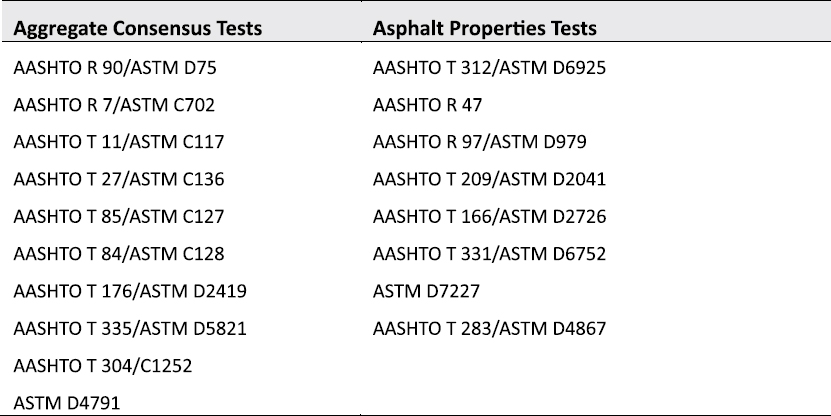
website “. . . no technician operates, or should operate, without access to standards and other laboratory documents . . .” REF https://www.asphaltinstitute.org/training/seminars/national-binder-technician-certification-nbtc/nbtc-exams/. The written exam includes 60 questions and passing is determined by at least 80 percent on the exam as a whole and 70 percent for each of the five sections. The proficiency exam involves conducting AASHTO M 320 binder tests (tests not specifically noted but AASHTO T 48, T 240, T 315, T 316, R 28 tests are implied). The NETTCP asphalt binder certification is fully reciprocal to NBTC.
The National Emulsion Technician Certification Program (NETC) started after NBTC and is set up similarly, but the lecture portion of the in-person class is only one day, and two days for the written and proficiency exams. The virtual class is for four days, and the lecture portion of the online class is two days, with the written exam on the third day and practical exams on the third and fourth day. The NETC has the same prerequisite experience requirements as NBTC.
AI also has an Airfield Pavement Inspector Certification and other training related to airfield paving. The AI website also maintains online training on a variety of areas related to asphalt in their Asphalt Academy learning system.
References
ASTM International
ASTM is well known as a standards organization but recently developed Construction Materials Testing (CMT) certification programs to address soils, asphalt aggregates, and asphalt mixtures. At about the same time the ASTM Committee that deals with certification, E36, developed ASTM E2659 Standard Practice for Certificate Programs. ASTM E2659 was first published in 2009.
The ASTM Certification programs are listed in Table E4.
The programs are designed to meet the certification requirements included in ASTM E329 and each of the materials related standards: ASTM C1077 for soils, ASTM D3740 for aggregates, and ASTM D3666 for asphalt mixtures. The CMT certification process involves three different enterprises, off-the shelf type software applications: Certemy, Questionmark, and Credly. Certemy handles certification management (registration and payment), Questionmark is an online
Table E4. ASTM certification programs.

scheduling and testing platform, and Credly is a digital certification database which includes a method for supervisor endorsement of the performance exam. ASTM also uses Proctorio for online proctoring.
All the certifications involve a 90-minute closed Book test with 90 questions. Passing is determined by scoring at least 60 percent on each test method and 70 percent overall. The supervisor or manager submits a performance checklist online to satisfy the performance aspect. Certifications are good for five years.
ASTM also has online training in soils, aggregate, asphalt, concrete, and other construction-related topics that are not directly associated with the certification. The programs are online “eLearning” that include test methods and a graded quiz. CEUs, PDHs, and a certificate is provided for scoring 80 percent or higher on the quiz.
ASTM methods were found in DOT certification programs, but no mention of ASTM certifications was found.
References
ASTM Personnel Certification and Certificate Programs Website https://credentialing.training.astm.org/#/https://newsroom.astm.org/astm-international-adds-certification-capabilities
National Center for Asphalt Technology at Auburn University
The National Center for Asphalt Technology (NCAT) was developed as a partnership between Auburn University and the National Asphalt Pavement Association (NAPA) in 1986. It maintains a Board of Directors that include members from NAPA, Auburn, and the pavement industry. The NCAT main facility is in Auburn, Alabama. NCAT also manages an accelerated loading facility in the form of a Test Track located in nearby Opelika.
NCAT has certification programs in the areas of asphalt, inertial profilers, and airfield asphalt. The certification programs are listed in Table E5.
The asphalt certification programs are held in-person at the NCAT Test Track facility. The Asphalt Mix Design certification is a four-and-a-half-day course. It follows the AI MS-2, Asphalt Mix Design Methods manual. The certification is valid for three years and requires passing an exam with a minimum 75 percent. The PG Binder Technician certification is also a four-and-a-half-day course. It follows the AI MS-25, Asphalt Binder Testing manual. The certification is valid for three years and requires passing an exam with a minimum 80 percent.
Table E5. NCAT certification programs.

NCAT also hosts six of the Alabama DOT certifications and three certification courses for Puerto Rico: earthwork and base, asphalt technician, and roadway (HMA) technician.
References
NCAT: https://eng.auburn.edu/research/centers/ncat/
National Institute for Certification in Engineering Technologies
The National Institute for Certification in Engineering Technologies (NICET) is a division of the National Society of Professional Engineers (NSPE). NICET was developed from a FHWA Contract completed in 1979 to develop a certification program (Farouki, Clark, and Atrim, 1999). It is managed by a volunteer Board of Governors that includes members from NSPE and other engineering societies.
NICET has certification programs in the areas of civil engineering technology, fire protection, electric power testing, and systems software. The construction materials testing certifications of soils, asphalt, and concrete under the civil engineering technology program are listed in Table E6.
Table E6. NICET certification programs.
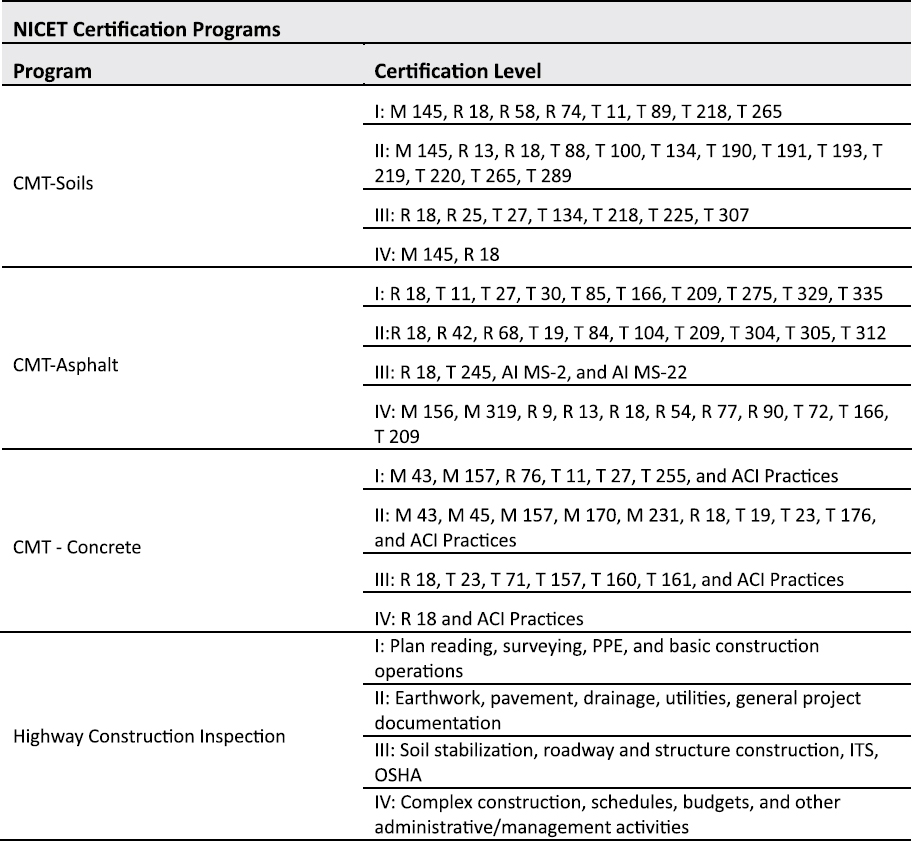
Each certification program has four levels of certification. Lower levels are prerequisites for the next level. The website notes the references that are allowed in the test center for each testing level. The documents are composed of an extensive list of ASTM test methods along with some AASHTO test methods. The AASHTO test methods are available during the exam and are listed in Table E6 to provide an example of the types of tests considered in each level. Note this is not a complete listing of test methods; typically each of the levels include another 20 ASTM test methods; the complete lists are available at nicet.org. The Highway Construction Inspection Certification Program does not identify specific test methods.
NICET certifications do not include any associated training. The website specifically notes that the certification programs follow ANSI 17024, which as noted in Chapter 2 requires certification and testing to be performed by separate entities. The website provides a listing of recognized training providers. The providers must agree to provide broad training and are specifically forbidden from taking NICET examinations to prevent them from providing training related to the certification exam content. Of the 46 potential training providers listed, only seven are related to CMT. Columbus State Community College is listed on the website and is noted as being involved with Ohio DOT’s certification program. FHWA’s National Highway Institute and the NSPE are both listed. Other providers that note CMT training were from a college in New Jersey, another college from Ohio, and two private firms (https://www.nicet.org/training/training-partners/).
NICET added a performance examination option in 2019. The performance exams are delegated to administrators. A listing of test methods that may be evaluated are located on the website; they are a subset of the test methods identified in Table E6 and include 10 AASHTO Soils methods, 13 AASHTO Aggregate methods, 6 AASHTO asphalt mixture methods, and 10 AASHTO concrete methods.
Reference
Farouki, A., M.A. Clark, and J.D. Antrim, “Basic Elements in the Design of a Certification Program for Hot-Mix Asphalt Construction Personnel” in Hot Mix Asphalt Construction: Certification and Accreditation Programs, ASTM STP 1378, S. Shuler and J.S. Moulthroup, Eds, ASTM, West Conshohocken, PA, 1999, pp. 76–86.
NICET: https://www.nicet.org/
National Ready Mix Concrete Association
The National Ready Mix Concrete Association (NRMCA) is a non-profit association founded in 1930 and is focused on ready-mix concrete. A Board of Directors governs the association. NRMCA partners with local chapters which operate independently.
NRMCA maintains several training and certification programs. The certification programs are mainly focused on plant operations but do include some personnel certifications with a materials testing component. It has been reported that over half of the ready-mix plants in the U.S. are NRMCA certified (CI 2014). The Plant and Truck certifications have been in place since 1966 and identify that the conditions can meet standards like ASTM C94. In 2013, a Quality Certification was added to supplement the existing plant certifications. While the plant and truck certifications identify that they are equipped to meet the basic specifications for ready-mix concrete, the Quality Certification identifies that the processes and personnel are in place to deliver a quality product. The NRMCA certifications that could be applicable to DOTs are identified in Table E7.
Table E7. NRMCA certifications.
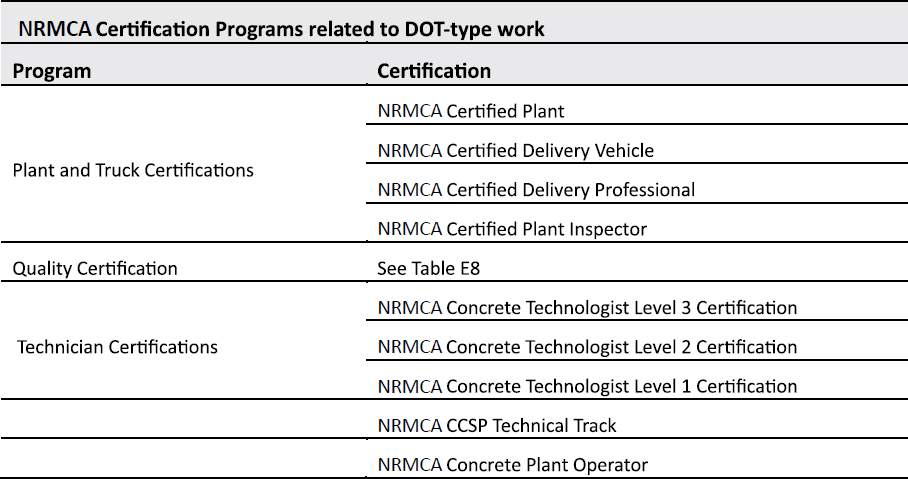
The Quality Certification identifies the key personnel and requirements shown in Table E8.
Table E8. NRMCA quality certification.
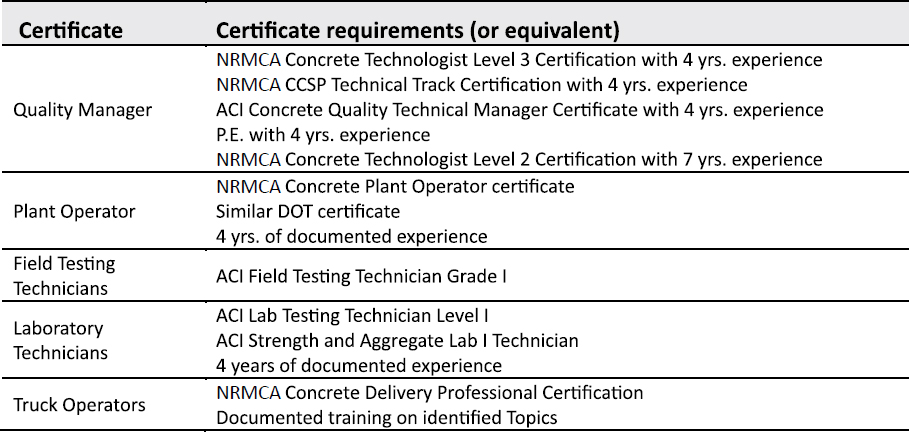
References
The New NRMCA Quality Certification Program, Concrete International, 2014
NRMCA, NRMCA Quality Certification: Certification Criteria Document, 2016
National Precast Concrete Association
The National Precast Concrete Association (NPCA) is a non-profit entity focused on the precast concrete industry.
Table E9. NPCA Master Precaster certification.
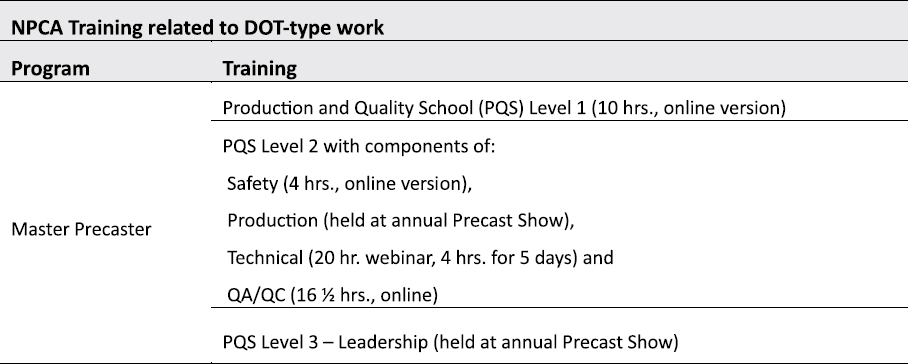
NPCA certifies Precast Concrete Plants and has a Master Precaster Program that includes personnel training; the training levels are shown in Table E9. The Quality Control Manual for Precast Plants identifies qualified personnel as required, and notes NPCA’s Production and Quality School (PQS) Level 1 as one of the requirements for qualified personnel. The PQS Level 1 training is available online in both English and Spanish.
The NPCA website notes 391 certified plants throughout North America. NPCA’s website also notes that 75 percent of DOTs recognize NPCA plant certification (https://precast.org/wp-content/uploads/092623_Certification_CertificationSellSheet.pdf).
References
NPCA https://precast.org
Precast/Prestressed Concrete Institute
Precast/Prestressed Concrete Institute (PCI) is a non-profit entity focused on the precast/prestressed concrete industry. It is supported by members who contribute annual membership dues to the institute and lead by an elected Board. PCI has 11 regional affiliates in the US called Chapters.
PCI certifies personnel in the areas of Plant and Field Quality Control Technicians/Inspectors. The Plant Quality Control Technician/Inspector certifications consist of three levels; each level is a prerequisite to the next level. Level III requires attendance at a PCI Level III training course, Levels I and II have optional training courses available, but certification exams can be taken without formal training.
The Field Quality Control Technician/Inspector certification is also called an Auditor. The Auditor certifications are focused on erection of precast materials and the associated quality and safety standards.
PCI also has Plant Certification programs and PCI Erector Certification, which are company based, not individual personnel certifications.
The personnel certifications applicable to DOTs are identified in Table E10.
Table E10. PCI certifications.
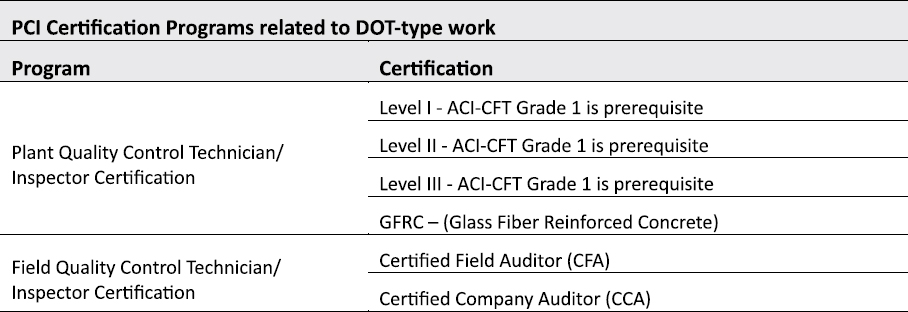
Plant Levels I, II, and III all require ACI-CFT Grade 1 as a prerequisite. They also necessitate either education or experience requirements. The Plant Level I certification exam is focused on dimension tolerances, precast specifications, and quality control testing and sampling procedures. The exam is closed book with 40 multiple choice questions that applicants must complete in one hour with a minimum of 70 percent correct. Certification is good for 5 years. Individuals that have been certified for 15 years can request exemption from future recertifications.
Field Quality Control Technician/Inspector Certification (Auditor) does not require ACI certification and does not involve sampling or testing requirements.
References
PCI www.pci.org and
PCI certification https://www.pci.org/PCI/PCI-Certification/Personnel/GFRC.aspx https://www.concrete.org/aboutaci.aspx
Washington Area Council of Engineering Laboratories
The Washington Area Council of Engineering Laboratories (WACEL) is a public-private partnership that had its beginnings in tragedy. In 1973, a high-rise condominium building under construction collapsed in Virginia. The collapse was caused by improper construction procedures and resulted in 14 deaths (Skyline Plaza found in https://www.nist.gov/el/skyline-plaza-building-failure-virginia-1973). This tragedy led to WACEL’s creation. WACEL has produced individual personnel certification programs. The first construction material technician program was created in 1975, and laboratory accreditation focused on structural efforts (WACEL website https://www.wacel.org/about/history/).
WACEL currently has 10 potentially DOT-related certifications out of a total of 12 certification programs. They also note that their requirements are similar to those of ACI, ASTM, NICET, ICC, and local governments. They have five-year certifications and include written and proficiency exams for soils and concrete testing. The website states that they have a Memorandum of Understanding with MARTCP in relation to the Soil and Aggregate Certification. They offer MARTCP Soil and Aggregate Written and Practical Tests along with WACEL certifications. WACEL allows testing internally following a videotaped process.
WACEL also has a resources page with links to 13 Study Guides (concrete technician and practical are separate), seven Concrete Test Method videos on Vimeo, a MARTCP manual on
soils and aggregates, four Maryland DOT test methods, and several YouTube training videos from 2021 developed by the Maryland DOT.
Their website identifies AASHTO, Maryland State Highway Administration, and Virginia DOT (among others, including the State of New Jersey and Washington, D.C.) as recognizing the WACEL programs.
Reference
WACEL website https://www.wacel.org











